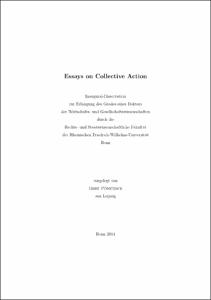Essays on Collective Action

Essays on Collective Action

| dc.contributor.advisor | Kube, Sebastian | |
| dc.contributor.author | Pönitzsch, Gert | |
| dc.date.accessioned | 2020-04-19T14:54:08Z | |
| dc.date.available | 2020-04-19T14:54:08Z | |
| dc.date.issued | 06.08.2014 | |
| dc.identifier.uri | https://hdl.handle.net/20.500.11811/5957 | |
| dc.description.abstract | This dissertation comprises 3 chapters dealing with collective action. Chapter 1 explores the behavior of individuals who face the provision of a public good that requires a minimal amount of aggregate contributions. Using a laboratory experiment we show that, unlike in the provision of linear public goods, an endogenous move order of players does not improve cooperation rates and payoffs. We also identify a specific externality: When observing unfair contributions, players wait for the contributions of others and thereby leave their group members uninformed about their willingness to contribute. Chapter 2 studies the valuation of bundles of public and private goods, such as sustainably fished seafood, certified wood products, or green electricity. We analyze individuals' willingness to pay (WTP) for a private good, a cup, and a public good, a donation to a charity. In an experiment we offer the goods either as a bundle or separately. Our data show that the WTP for the bundle exceeds the WTP for the separately offered public and private good. A review of several behavioral concepts suggests behavior consistent with the data. Chapter 3 analyzes how the political system affects campaigns of political candidates and the voters' capacity to empower competent politicians. Our model shows that variations in power concentration involve a trade-off. On the one hand, higher power concentration enables the voters' preferred politician to enforce larger parts of his agenda. On the other hand, higher power concentration increases electoral stakes and distorts politicians' campaigns. We identify a negative relation between the optimal level of power concentration and the extent of politicians' office motivation. The results of an empirical analysis are in line with this prediction. | en |
| dc.language.iso | eng | |
| dc.rights | In Copyright | |
| dc.rights.uri | http://rightsstatements.org/vocab/InC/1.0/ | |
| dc.subject | öffentliche Güter | |
| dc.subject | endogene Reihenfolge | |
| dc.subject | Experiment | |
| dc.subject | Bundling | |
| dc.subject | impure public goods | |
| dc.subject | Bewertung | |
| dc.subject | Machtkonzentration | |
| dc.subject | politische Selektion | |
| dc.subject | politische Systeme | |
| dc.subject | public goods | |
| dc.subject | endogenous order | |
| dc.subject | laboratory experiment | |
| dc.subject | valuation | |
| dc.subject | power concentration | |
| dc.subject | political selection | |
| dc.subject | constitutional design | |
| dc.subject.ddc | 330 Wirtschaft | |
| dc.title | Essays on Collective Action | |
| dc.type | Dissertation oder Habilitation | |
| dc.publisher.name | Universitäts- und Landesbibliothek Bonn | |
| dc.publisher.location | Bonn | |
| dc.rights.accessRights | openAccess | |
| dc.identifier.urn | https://nbn-resolving.org/urn:nbn:de:hbz:5-37061 | |
| ulbbn.pubtype | Erstveröffentlichung | |
| ulbbnediss.affiliation.name | Rheinische Friedrich-Wilhelms-Universität Bonn | |
| ulbbnediss.affiliation.location | Bonn | |
| ulbbnediss.thesis.level | Dissertation | |
| ulbbnediss.dissID | 3706 | |
| ulbbnediss.date.accepted | 04.02.2014 | |
| ulbbnediss.fakultaet | Rechts- und Staatswissenschaftliche Fakultät | |
| dc.contributor.coReferee | Falk, Armin |
Dateien zu dieser Ressource
Das Dokument erscheint in:
-
E-Dissertationen (288)




